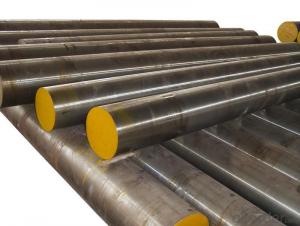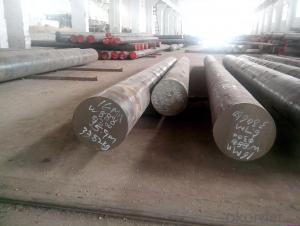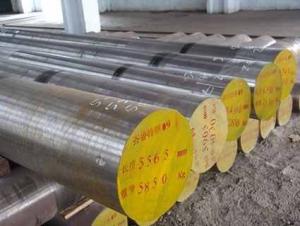45# China Standard Forged Steel Round Bar
- Loading Port:
- Shanghai
- Payment Terms:
- TT or LC
- Min Order Qty:
- 25 m.t.
- Supply Capability:
- 10000 m.t./month
OKorder Service Pledge
OKorder Financial Service
You Might Also Like
Product Description:
OKorder is offering Round Bar at great prices with worldwide shipping. Our supplier is a world-class manufacturer of steel, with our products utilized the world over. OKorder annually supplies products to European, North American and Asian markets. We provide quotations within 24 hours of receiving an inquiry and guarantee competitive prices.
Product Applications:
1) Suitable for making various strong cutting tool abrasion resistance, impact resistance.
2) Used to produce all kinds of high hard and super hard saw blade, drill, tap, broach, gear hob and various kinds of milling cutter.
3) Used for advanced punching die, screw die, and the toughness and complicated shape of the punch, etc.
Product Advantages:
OKorder's Round Bar are durable, strong, and resist corrosion.
Main Product Features:
· Premium quality
· Prompt delivery & seaworthy packing (30 days after receiving deposit)
· Corrosion resistance
· Can be recycled and reused
· Mill test certification
· Professional Service
· Competitive pricing
Product Specifications:
Diameter | Mass | Diameter | Mass | Diameter | Mass |
(mm) | (kg/m) | (mm) | (kg/m) | (mm) | (kg/m) |
6 | 0.22 | 22 | 2.98 | 53 | 17.30 |
7 | 0.30 | 24 | 3.55 | 56 | 19.30 |
8 | 0.40 | 25 | 3.85 | 60 | 22.20 |
9 | 0.50 | 26 | 4.17 | 63 | 24.50 |
10 | 0.62 | 28 | 4.83 | 65 | 26.00 |
11 | 0.75 | 30 | 5.55 | 70 | 30.20 |
12 | 0.89 | 32 | 6.31 | 75 | 34.70 |
13 | 1.04 | 34 | 7.13 | 80 | 39.50 |
14 | 1.21 | 36 | 7.99 | 85 | 44.50 |
15 | 1.39 | 38 | 8.90 | 90 | 49.90 |
16 | 1.58 | 40 | 9.86 | 95 | 55.60 |
17 | 1.78 | 42 | 10.90 | 100 | 61.70 |
18 | 2.00 | 45 | 12.50 | 120 | 88.85 |
19 | 2.23 | 48 | 14.20 | 140 | 120.93 |
20 | 2.47 | 50 | 15.40 | 150 | 138.82 |
Material: Mild Steel
Heat treatment of high quality steel:
Fire: Isothermal annealing temperature is 800 ~ 880 °C, with 10 ~ 20 °C, the furnace cooling to about 600 °C, hardness above HB269.
Preheat temperature: 730-730 °C
Quenching temperature: 1190-1210 °C
Tempering temperature: 540-595 °C
Cold drawn, hardness 285 HBS
Cold drawn after annealing condition, hardness 277 HBS
Quenching methods: oil quenching, air cooling or salt bath quenching
FAQ:
Q1: Why buy Materials & Equipment from OKorder.com?
A1: All products offered byOKorder.com are carefully selected from China's most reliable manufacturing enterprises. Through its ISO certifications, OKorder.com adheres to the highest standards and a commitment to supply chain safety and customer satisfaction.
Q2: How do we guarantee the quality of our products?
A2: We have established an advanced quality management system which conducts strict quality tests at every step, from raw materials to the final product. At the same time, we provide extensive follow-up service assurances as required.
Q3: How soon can we receive the product after purchase?
A3: Within three days of placing an order, we will begin production. The specific shipping date is dependent upon international and government factors, but is typically 7 to 10 workdays.
Images:
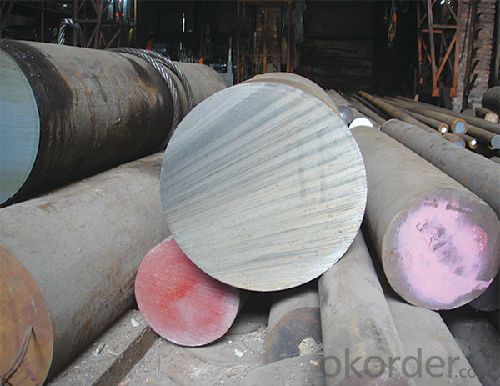
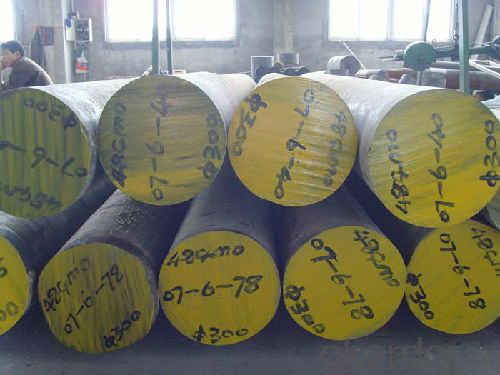
- Q:What are the different types of steel round bar alloys used in the automotive industry?
- In the automotive industry, there are several types of steel round bar alloys used due to their various properties and applications. 1. Carbon Steel: Carbon steel round bars are widely used as they offer good strength and toughness. They are used in various automotive components such as axles, crankshafts, and gears. 2. Alloy Steel: Alloy steel round bars contain additional alloying elements such as chromium, nickel, or molybdenum. These alloys enhance the mechanical properties of the steel, making it stronger and more durable. Alloy steel round bars are commonly used in automotive applications like suspension components, drive shafts, and steering components. 3. Stainless Steel: Stainless steel round bars are highly resistant to corrosion, making them suitable for automotive applications that require durability in harsh environments. They are commonly used in exhaust systems, fuel tanks, and body parts. 4. Tool Steel: Tool steel round bars have high hardness, wear resistance, and toughness. They are mainly used in the production of automotive tools and dies, such as punches, dies, and cutting tools. 5. Bearing Steel: Bearing steel round bars are specifically designed to provide excellent wear resistance and high load-carrying capacity in automotive bearings. These bars have a high level of hardness and are heat-treated to ensure optimal performance. 6. Spring Steel: Spring steel round bars are used in automotive suspension systems and other applications that require excellent elasticity and fatigue resistance. These bars can withstand repeated stress and maintain their shape, making them ideal for automotive springs and stabilizer bars. It's important to note that the specific choice of steel alloy depends on the desired properties, performance requirements, and cost considerations for each automotive component.
- Q:Can steel round bars be used for making cutlery or kitchen utensils?
- Certainly, cutlery or kitchen utensils can indeed be crafted using steel round bars. Steel is a favored option for kitchen utensils due to its robustness, endurance, and ability to resist corrosion. Nevertheless, the specific steel variant and the manufacturing process employed will determine its suitability for culinary purposes. Stainless steel, for instance, is highly recommended for cutlery and kitchen utensils due to its resistance to rust and stains, effortless cleaning, and non-reactivity with food. Moreover, steel round bars can be effortlessly molded and shaped into a myriad of utensil designs, rendering them an adaptable material for the production of cutlery and kitchenware.
- Q:What are the different surface hardness options for steel round bars?
- The different surface hardness options for steel round bars depend on the specific heat treatment processes used. Common options include annealing for softening the steel and improving machinability, normalizing for uniform grain structure and increased strength, quenching and tempering for achieving high hardness and toughness, and case hardening techniques like carburizing or nitriding to create a hard outer layer while maintaining a softer core.
- Q:What are the tolerances for steel round bars?
- The tolerances for steel round bars can vary depending on the specific requirements of the application and the manufacturing process. Generally, the tolerances for steel round bars are specified in terms of diameter, straightness, and length. In terms of diameter tolerance, it is common to find tolerances ranging from +/- 0.001 inches to +/- 0.005 inches. This means that the actual diameter of the steel round bar can deviate within this range from the specified diameter. The specific tolerance will depend on the size and grade of the bar. Straightness tolerance refers to the allowable deviation in the straightness of the bar. This is typically specified as a maximum deviation per unit length, such as 0.125 inches per foot. It ensures that the bar remains straight and within acceptable limits when measured along its length. Length tolerance determines the allowable variation in the overall length of the round bar. This can range from +/- 0.125 inches to +/- 0.5 inches, depending on the size and grade of the bar. It ensures that the bar meets the required length specifications. It is important to note that these tolerances can vary depending on the industry standards, customer specifications, and the manufacturing method used. Additionally, certain applications may have more stringent tolerance requirements, especially in industries such as aerospace or automotive, where precision is critical. In summary, the tolerances for steel round bars encompass diameter, straightness, and length. The specific tolerances will depend on the size, grade, and application of the round bar, as well as any relevant industry standards or customer specifications.
- Q:How are steel round bars heat treated?
- To enhance the strength and hardness of steel round bars, as well as improve their mechanical properties, they undergo a heat treatment process comprising of three main steps: heating, soaking, and cooling. To begin with, the steel round bars are subjected to heating at a specific temperature referred to as the austenitizing temperature. This temperature is typically higher than the critical temperature of the steel, enabling the material to transform into its austenite phase. The exact austenitizing temperature varies depending on the type of steel and the desired properties. Once the steel round bars reach the austenitizing temperature, they are then soaked at this temperature for a specific duration. This soaking period ensures a complete transformation of the microstructure, promoting uniformity and preventing any thermal gradients within the material. The duration of soaking plays a vital role in determining the ultimate properties of the steel. After the soaking phase, the steel round bars undergo rapid cooling through a process known as quenching. Quenching is typically achieved by immersing the bars in a quenching medium, such as oil, water, or air, depending on the desired hardness and properties. The quenching process swiftly cools the bars, resulting in a martensitic transformation within the steel's microstructure. This transformation contributes to increased hardness and strength. Subsequently, the steel round bars may undergo an additional step called tempering. Tempering involves reheating the bars to a lower temperature, usually below the austenitizing temperature. This step aims to alleviate the brittleness caused by the quenching process while further enhancing the material's toughness and ductility. In summary, the heat treatment process for steel round bars involves heating to the austenitizing temperature, soaking for a specific duration, quenching to rapidly cool and harden the material, and potentially tempering to achieve the desired properties. This process allows for the customization and improvement of the steel's mechanical properties, making it suitable for a wide range of applications.
- Q:What are the different types of steel round bar coatings used in the marine industry?
- There are several types of steel round bar coatings commonly used in the marine industry, including galvanized coatings, epoxy coatings, and corrosion-resistant coatings. These coatings help protect the steel from rust and corrosion caused by exposure to saltwater and other harsh marine environments.
- Q:Excuse me, the difference between round steel, screw steel, steel, plate material, steel wire, hope professional answer
- Disk and rebar with rib, have all the same, basically can not see, rebar size is more than Phi 9, a lot of hardness than wire reinforced strong general, so the steel strip is usually linear, bluntly, steel disc is not up, disc. The size can be intercepted, so can be screwed up disc.
- Q:Can steel round bars be bent or formed into shapes?
- Yes, steel round bars can be bent or formed into shapes. Steel is a highly versatile material with excellent strength and durability, making it suitable for various applications. To bend or form steel round bars, various techniques such as heating, hammering, or using specialized machinery like hydraulic presses or roll benders can be employed. These methods allow the steel bars to be shaped into curves, angles, or specific forms to meet the desired requirements. However, it is important to note that the extent to which a steel round bar can be bent or formed depends on factors such as the diameter, type of steel, and the specific bending/forming technique used.
- Q:Can steel round bars be used in the production of agricultural equipment?
- Yes, steel round bars can be used in the production of agricultural equipment. Steel is a commonly used material in the manufacturing industry due to its strength, durability, and versatility. Agricultural equipment such as plows, harrows, cultivators, and sprayers often require strong and sturdy components to withstand the harsh conditions of farming. Steel round bars can be used to create various parts of these machines, including axles, shafts, handles, and structural supports. The high tensile strength of steel ensures that the equipment can withstand the heavy loads and repetitive use that is typically required in agriculture. Additionally, steel can be easily welded, machined, and formed into different shapes and sizes, making it suitable for a wide range of agricultural equipment applications. Overall, steel round bars are a reliable and cost-effective choice for the production of agricultural equipment.
- Q:What are the different types of defects that can occur in steel round bars?
- Some common types of defects that can occur in steel round bars include surface defects such as cracks, pits, and scratches, as well as internal defects like inclusions, segregation, and porosity. Additionally, steel round bars can also experience dimensional defects such as ovality, taper, and straightness issues.
1. Manufacturer Overview |
|
|---|---|
| Location | |
| Year Established | |
| Annual Output Value | |
| Main Markets | |
| Company Certifications | |
2. Manufacturer Certificates |
|
|---|---|
| a) Certification Name | |
| Range | |
| Reference | |
| Validity Period | |
3. Manufacturer Capability |
|
|---|---|
| a)Trade Capacity | |
| Nearest Port | |
| Export Percentage | |
| No.of Employees in Trade Department | |
| Language Spoken: | |
| b)Factory Information | |
| Factory Size: | |
| No. of Production Lines | |
| Contract Manufacturing | |
| Product Price Range | |
Send your message to us
45# China Standard Forged Steel Round Bar
- Loading Port:
- Shanghai
- Payment Terms:
- TT or LC
- Min Order Qty:
- 25 m.t.
- Supply Capability:
- 10000 m.t./month
OKorder Service Pledge
OKorder Financial Service
Similar products
New products
Hot products
Related keywords
